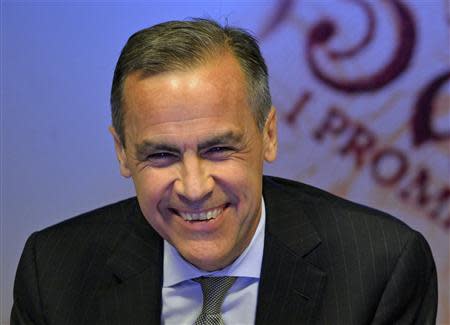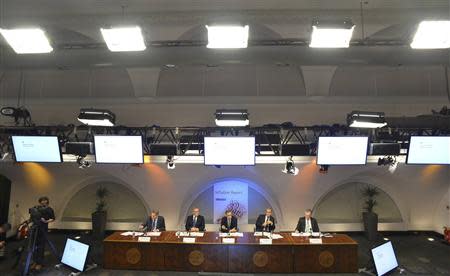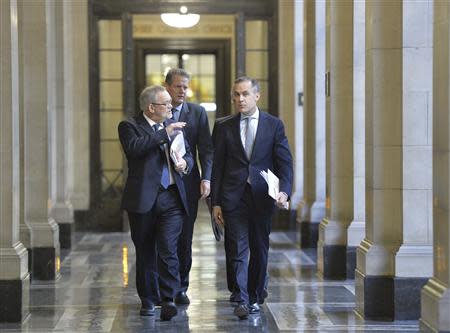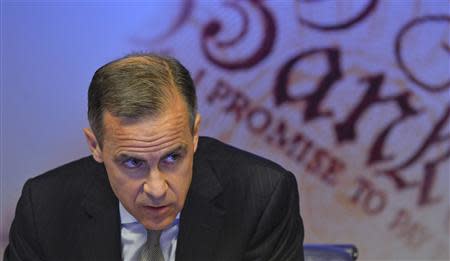Bank of England slashes jobless forecast, sows confusion over guidance
By David Milliken and Costas Pitas LONDON (Reuters) - The Bank of England slashed its unemployment forecast on Wednesday but said an early fall in the jobless rate would not trigger interest rate hikes, leaving analysts confused over its new centrepiece policy of forward guidance. When the bank's Governor Mark Carney launched the policy in August, he promised to keep rates at a record low at least until unemployment fell to 7 percent - something the bank forecast at the time would take more than three years. But on Wednesday the bank forecast unemployment could hit that level as soon as the end of next year, while at the same time stressing heavily that higher interest rates would hinge on other factors such as labour market productivity. "It's not good for the Bank of England's credibility to have to shift forecasts in such an abrupt way," said Ross Walker, UK economist at Royal Bank of Scotland. "Ultimately ... it sends a confused message." The bank has held British interest rates at 0.5 percent since 2009 as it tried to nurse the economy back to health after the financial crisis. The new forecasts raise the prospect of a first rate rise before a national election in May 2015. Carney sounded his most upbeat about the British economy since he took over at the bank in July, buoyed by a string of upbeat data releases and a big fall in inflation in October. "For the first time in a long time you don't have to be an optimist to see the glass is half full. The recovery has finally taken hold," he told a news conference. However, the BoE stressed that it was not about to raise interest rates as headwinds remained, particularly from the euro zone, and Carney reiterated a fall in unemployment to 7 percent was not an automatic trigger for raising rates. Data published earlier on Wednesday showed Britain's unemployment rate fell to 7.6 percent in the three months to September, edging closer to the BoE threshold. Sterling jumped and British government bond prices fell to their lowest level in seven weeks as investors adjusted to the BoE's new, shorter timeframe for when unemployment might fall to 7 percent. FORECAST CONFUSION Financial markets, which were always sceptical about the August unemployment forecast, did not change their bets that the BoE will raise interest rates around early 2015. The Bank's new projections were complicated by changes to the assumptions underlying its main unemployment forecasts. While August's forecasts assumed constant interest rates, which would now imply 7 percent unemployment late next year, the BoE said it would focus on forecasts that took into account how fast markets expect rates to rise. On this basis, unemployment will stay above 7 percent until the end of 2016. Another way of dicing the forecast cited by Carney shows a greater than 50 percent chance unemployment would be at 7 percent by the third quarter of 2015. Many private-sector economists were left non-plussed. "The constant rates assumption confused things a lot today," said David Tinsley of BNP Paribas. "We're back in a world where we're having to divine what they mean from two sets of forecasts, which suggests forward guidance doesn't add a lot of clarity." But Carney said that without the long-term guidance policy, Britain's recovery would be at risk of premature increases in borrowing costs in markets. "Let's say we didn't have forward guidance in August ... the discussion would be 'Is the Bank going to raise rates today?' No one is asking that question today, and rightly so, because that would be foolish," he said. Based on market interest rate expectations, the BoE sees inflation below its 2 percent target in early 2015, six months earlier than it expected in August, and sees less chance of it breaching one of the 'knock-out' conditions that could void the guidance. The Bank also revised up its growth forecasts. It sees 0.9 percent growth in the last three months of 2013, taking full-year growth to 1.6 percent from 1.4 percent forecast in August. For 2014 it expects annual growth of 2.8 percent, compared with 2.5 percent it predicted in August. Britain's economic output remains well below pre-crisis levels, unlike in most other major economies, and the BoE believes it can keep rates low without the risk of inflation. Unlike many private-sector forecasters, most BoE officials are convinced that a rebound in weak labour market productivity means companies will not need to ramp up hiring quickly. Britain's unemployment rate was nearer 5 percent before the financial crisis, and deputy governor Charlie Bean suggested last month that the 7 percent threshold could be lowered if domestic inflation pressures appeared muted. Carney said such a change could not be ruled out, but said a decision would only be made once unemployment was at 7 percent and the BoE knew more about productivity changes. He also said the BoE was watching Britain's recovering housing market closely but would not act because of prices in London, which are up about 10 percent over the past 12 months. (Additional reporting by the UK bureau; editing by William Schomberg and Jeremy Gaunt)

 Yahoo Finance
Yahoo Finance 



